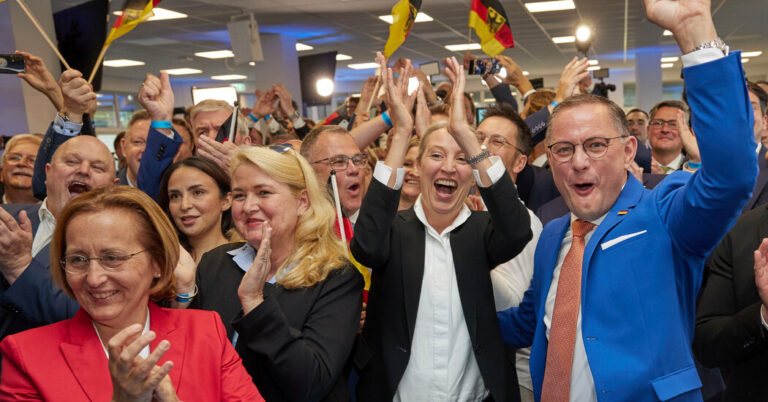The right-wing Alternative for Germany party won a record number of votes in Sunday’s European Parliament elections, a stern rebuke to German Chancellor Olaf Scholz’s three-party coalition government and a sign of a shift toward right-wing politics across the continent.
The party, known as the AfD, won 16 percent of the vote, placing it second only to Germany’s conservative Christian Democrats, which won 30 percent. The AfD received nearly 5 percentage points more than it did in the 2019 election. The AfD’s victory in the election gave it more votes than each of Germany’s three coalition parties, marking its strongest showing in a national election, but opinion polls show Scholz’s coalition government’s approval rating is at its lowest ever in the country.
On Monday, Alice Weidel, one of the AfD’s two leaders, called on Mr Scholz to call new parliamentary elections, just as French President Emmanuel Macron has done following his party’s dismal showing. A spokesman for Mr Scholz has ruled out early elections.
Speaking at a news conference in Berlin, Weidel said his party was seeing “enormous successes” and that the government was working against Germany, not for it. “People are fed up with that,” he said.
The outcome could have far-reaching consequences. A comprehensive European plan for a set of environmental measures, known as the Green Deal, could lose momentum, and Scholz’s opponents have already begun to question the legitimacy of his government. They argue that if the EU election results are borne out, they could show that just a third of Germans support his three-way government.
Once a minority group, the AfD is under scrutiny by Germany’s domestic intelligence services for suspected “extremism,” and three-quarters of Germans see the party as a threat to democracy. But outrage over the killing of a police officer and the arrest of an Afghan immigrant suspected of a stabbing attack in Mannheim, Germany, just days before EU elections may have reignited the fear tropes the AfD exploits on a daily basis.
The AfD has also performed stronger than in the past, despite a series of public scandals that led to two of its leading candidates for EU posts being barred from campaigning, and millions have taken to the streets this year to protest the party’s anti-immigration stance, including at a rally attended by AfD members where they discussed mass deportations.
“It’s remarkable that the party has risen from the ashes,” said Sueda David Wilp, regional director for the German Marshall Fund’s Berlin office. But discontent with the government, its strong support base in East Germany (the AfD led in all five East German states in the EU vote), and recent attacks on police officers are more likely what have propelled the AfD forward, he said.
“They’re not going to disappear from the German political landscape anytime soon,” she added.
AfD members celebrated the result on Sunday night, even though it fell short of the peak vote share predicted in polls months ago, when the party was thought to have been on track to win nearly 25 percent.
Weidel attributed the result to disgust with the status quo: “People are fed up with the bureaucracy in Brussels,” he told Germany’s public broadcaster after the first estimated results were published on Sunday night.
Mr Scholz appeared at the Social Democrats’ headquarters in Berlin after the results were announced on Sunday evening, but when asked by a reporter if he wanted to comment, he replied “no”, according to German magazine Der Spiegel.
The AfD’s fortunes have risen in tandem with the decline of its once stronghold in Germany, the climate-focused Green Party, whose vote share has nearly halved to about 12% from more than 20% in the 2019 election, according to preliminary results.
“Although the AfD gained seats, it is also clear that very few young people from us in the Green Party switched to the AfD. Instead, many young people voted for smaller parties that have policies closer to the Greens and focus more on individual issues,” Emilia Vöster, a Green lawmaker and one of the party’s youngest elected members, said in an email. “This gives me hope.”
In the election, which was also the first in which 16- and 17-year-olds in Germany were allowed to vote, the AfD won big among under-30s, increasing its share of that demographic by 10 percentage points, results showed. The Green Party, once buoyed by activist Greta Thunberg and student protests against climate change, saw an 18 percentage point drop in that demographic.
“Younger voters have traditionally tended to be left-leaning and progressive,” Florian Steckel, a politics professor at the University of Exeter in the UK, said in an email, “but this time they have moved right.”
He added that the AfD’s recent attempts to promote itself on TikTok could have had an impact.
“This is in line with recent findings that across Europe young people, and particularly young men, tend to adopt more right-leaning positions,” Steckel said.
Ultimately, the result may be more of a symbolic win for the AfD than a power-shifter in the European Parliament: Last month, the party was expelled from the European Parliament’s far-right Identity Democrats group after its top EU candidate, Maximilian Kurler, made vague comments in May about how evil the Nazi SS was.
On Monday, AfD members voted to exclude Kula from the party’s EU delegation. Ultimately, the party will send 14 members to Brussels instead of nine, but their powers will be limited like other far-right forces in parliament.
Tatiana Firsova contributed reporting.

